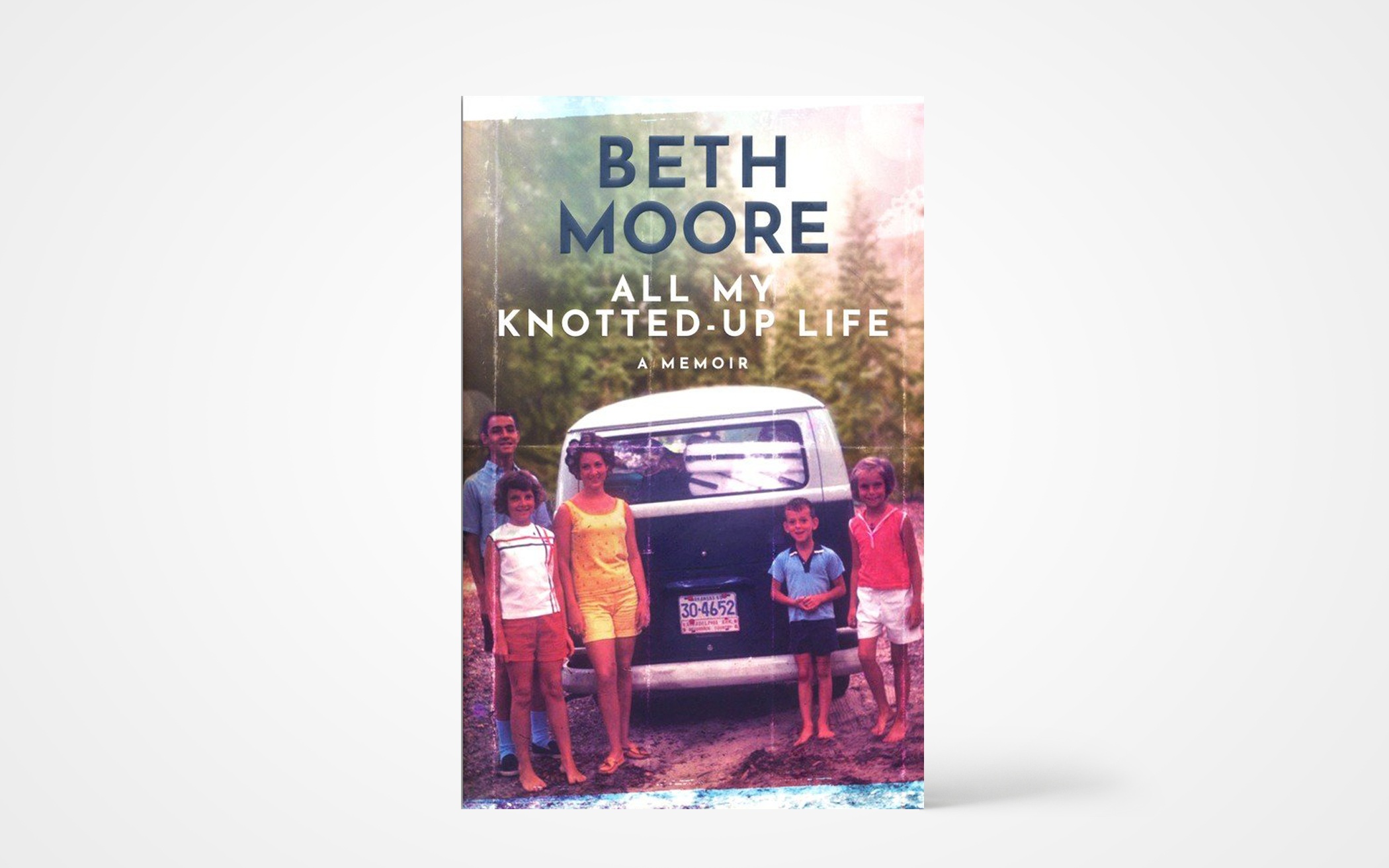That Beth Moore, once the veritable poster child for the Southern Baptist Convention, is now described as being an “American Anglican” on her Wikipedia page hints at the surprising arc of her memoir, All My Knotted-Up Life.
Beth Moore is one of my favorite people, though I used to write her off as a big-haired “church lady.” She is big-haired, there is no doubt, but she’s also expansive of soul, mind, and heart. I would follow that woman to the ends of the earth, even more so after reading her astonishing story.
Raised in Arkadelphia, Ark., Moore pokes hilarious fun at her colorful, rural family, including a tobacco-chewing-and-spitting grandmother (I almost spit out my coffee reading about her). Her family was loving, with the terrible exception of her father, who sexually abused her at a young age. “No kind of good dad does what my dad did to me.” How she navigated the trauma of this horror is one of the most fascinating—if harrowing—parts of her story. Her beloved mother—and years later, her husband—suffered from mental illness, and Moore is frank and compassionate about all of it. As she unearths the broken pieces of her narrative, bringing them to the light, Moore models how to lament and grieve well while pressing into God’s healing. There’s no spiritual bypassing here, just honest reckoning of the good, the bad, and the ugly.
The good, bad, and ugly all describe her once-precious denomination, the Southern Baptist Convention, where she was nurtured beautifully as a child, teen, and young adult, up until she began to teach the Bible and became threatening to the SBC’s hyper-patriarchal leaders. Critics hit her where it hurt, including disapproving of her husband, Keith, not being the spiritual head of their household (as far as an outsider could tell). Instead of hailing her for her profound commitment to both her husband (who was raised Catholic and preferred fishing on a Sunday morning to joining “Lizabeth,” his name for her, at the Houston megachurch where she attended) and to studying Scripture, the powers that be grew more critical and dismissive as her platform grew. As her ministry flourished, sexism grew like weeds alongside it.
Temperatures reached a boiling point when Moore spoke out on Twitter in 2016 about then-candidate Donald Trump. As a sexual abuse survivor herself, Moore could not wrap her mind around his fierce evangelical support, even after the Access Hollywood tapes came out with the former president bragging about sexual assault.
The backlash against her was swift and poisonous. The deeply loyal congregant of the SBC was excoriated, mainly by fellow members who lashed out at her and called her, among other things, a “baby killer” for taking issue with Trump. (Moore is staunchly pro-life.)
Three years later, in 2019, Moore again swam against the strong currents of popular opinion when she spoke out against the widespread, systemic coverups of sexual abuse in the SBC. Heartsick, she finally left the denomination she loved and had faithfully served for her whole life, unable to remain in fellowship with those she still adored.
As she healed from her emotional losses, Keith was recovering slowly from a devastating and rare marine-borne bacterial infection he contracted while fishing. For a time, Moore and her two daughters grieved him as if he were dead, as the infection changed his personality so wholly.
But in the hands of the God who is making all things new, this story is shot through with glimmers of redemption. There is a very touching scene at the end of the book, when Moore and her husband, tired of Covid-era online worship but yet now bereft of any church home, look up the nearest Anglican church and bravely walk in together.
Keith cried tears of homecoming, kneeling on a prayer bench as he had when he was growing up, and his wife also cried, touched by the simple hospitality she—a famous Baptist, after all—found in the Anglican church. The church enfolded the couple and gave them a sanctuary in every sense.
A knotted-up life? Yes, we all live life tangling and untangling, sinning and being sinned against, and hopefully submitting ourselves to the one who takes our tightest, most entrenched knots and patiently unravels and smooths them out. In reading Beth Moore’s story, I laughed (the woman has an incredible sense of humor), cried (she does sad well, too), and marveled at her sheer courage and tender honesty. As with every good story, fiction or real life, Moore’s made me ponder anew my own life and God’s enduring presence in it. Don’t miss this poignant, hilarious, wise, and gorgeously written book. (Tyndale)
About the Author
Lorilee Craker, a native of Winnipeg, Man., lives in Grand Rapids, Mich. The author of 16 books, she is the Mixed Media editor of The Banner. Her latest book is called Eat Like a Heroine: Nourish and Flourish With Bookish Stars From Anne of Green Gables to Zora Neale Hurston.

